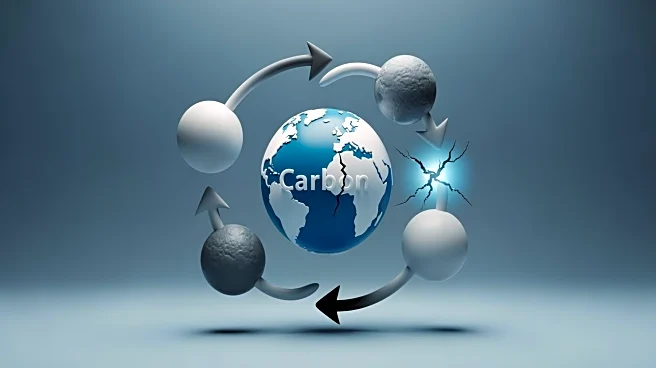What's Happening?
Scientists at UC Riverside have discovered a feedback mechanism in Earth's carbon cycle that could potentially lead to a global cooling event, akin to past ice ages. The research, published in Science,
highlights a missing element in the understanding of how Earth recycles carbon. Traditionally, it was believed that rock weathering, a process where rain absorbs carbon dioxide and reacts with rocks, helps stabilize Earth's climate by sequestering carbon in the ocean. However, the study reveals that increased atmospheric CO2 and global temperatures can lead to more nutrients like phosphorus entering the ocean, boosting plankton growth. This process, in turn, results in more carbon being buried on the ocean floor, potentially triggering a cooling feedback loop. The study's computer model suggests that this mechanism could overshoot, cooling Earth significantly and possibly leading to an ice age.
Why It's Important?
The findings have significant implications for understanding Earth's climate system and the potential long-term impacts of current global warming trends. While the immediate concern remains the ongoing warming due to human-induced CO2 emissions, the study suggests that Earth's natural processes could eventually lead to a cooling phase. This discovery challenges the notion of a stable climate system and underscores the complexity of Earth's feedback mechanisms. The potential for a future cooling event, although possibly thousands of years away, highlights the need for a nuanced approach to climate policy and mitigation strategies. It also raises questions about the long-term sustainability of current carbon emissions and the importance of reducing them to prevent extreme climate shifts.
What's Next?
The study suggests that while the next cooling phase may be milder due to higher atmospheric oxygen levels today, it could still advance the onset of the next ice age. This underscores the urgency of addressing current warming trends. Policymakers and scientists may need to consider these findings in future climate models and strategies. The research also opens avenues for further studies to explore the intricacies of Earth's carbon cycle and its impact on climate regulation. As the scientific community continues to investigate these processes, there may be increased emphasis on understanding and mitigating the immediate effects of global warming while preparing for potential long-term climate shifts.
Beyond the Headlines
The study highlights the ethical and policy challenges of addressing climate change. While the potential for a future cooling event may seem distant, it raises questions about intergenerational responsibility and the need for sustainable environmental practices. The research also emphasizes the importance of scientific inquiry in uncovering complex natural processes that could have profound impacts on human society. As the world grapples with the immediate effects of climate change, this study serves as a reminder of the dynamic and interconnected nature of Earth's systems.









